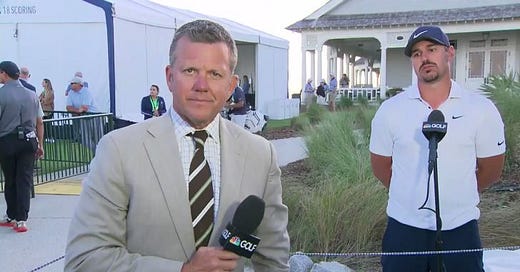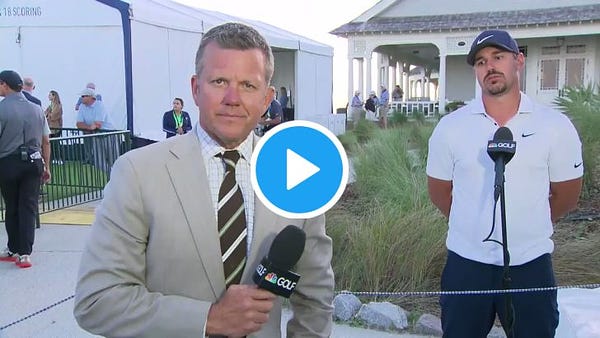Data isn't oil; The Random Olympic Argument Generator; How UFC uses women; NYT to buy The Athletic? (maybe); Brooks, Bryson and pro golf's contempt for its viewers; Why Paralympic gold is real gold
The newsletter of the podcast
A 45 second glimpse of reality
This clip did the rounds on social before being taken down. That’s a shame, because it was the most authentic piece of golf broadcasting I’ve seen in years.
So much going on in 45 seconds.
Yes of course, there’s Brooks Koepka’s eye rolling contempt for Bryson DeChambeau.
But then there’s the insight in to the far-too-cosy relationship between rights holder and broadcast partner, the complicity of the interviewer in protecting the facade, and his jokey certainty that nothing so revealing would ever be allowed to reach the people who pay the bill, the viewers.
We need a new metaphor for data
Upcoming podcast guest Matt Locke thinks deeply about the metaphors we use to frame the public understanding of important issues. It’s one of the reasons he set up Storythings. (Matt’s first UP podcast appearance remains one of our most popular ever. Hear it here #hearhere)
And he’s on to something here about the ‘data is the new oil’ trope.
But in the last few years, there has been a backlash against this extractive metaphor. In 2018 Cory Doctorow described Facebook’s data as an empire of low quality ‘oily rags’, recasting the metaphor to one of industrial waste, not liquid gold. In a recent speech, EU Vice President Margrethe Vestager tried to reposition data as a ‘reusable resource’, a more ecological metaphor that suggests ways of extracting value that doesn’t pollute the public sphere.
So if not oil, then what?
A metaphor that puts our personal experience at the forefront will help us find out where to draw lines in how our lives are stored and processed, and to understand that the lines will need to be different for different people. I don’t know what the right metaphor is - memory and history are the concepts I’ve been mulling over, but they have already been used in computing in ways that blur and dull them.
Maybe we should be very explicit, and refer to data as our lives. Imagine if a service had to ask you permission to ‘track your life’ or ‘share information about your life with other providers’. Already that feels grittier, more visceral, than just ‘data’.
Sport as entertainment and the idea of the audience we carry around in our heads
My conversation with Matt is about audience, and references a Columbia Journalism Review study, which asked newspaper editors to describe the people they think are their readers. The results were fascinating.
We need to carry out a similar experiment in sport.
The Super League fiasco revealed how owners thought of fans: They are a resource to be mined for commercial gain. The data as oil metaphor.
But digital culture has different expectations of what fandom is and this is bleeding in to sport. It’s the difference between the TV viewer - a remote, passive, receiver of content - and the online user - a peer to peer contributor.
Sports teams are fond of calling themselves ‘entertainment businesses’. Meanwhile their fans still think they’re football clubs.
As Matt points out in the podcast, it can be an expensive strategic error when the owners think they’re in a different business than their customers do.
Go deeper
The classic text: Metaphors We Live By (1980), by linguist George Lakoff and the philosopher Mark Johnson is about how metaphors structure the way we think and talk: life is a journey, and arguments are wars (you take sides, there can be only one winner, evidence is a weapon).
Listen: Why ‘The Hole in the Ozone Layer’ scared the shit out of us, although there’s no ozone layer and no hole.
Look out for the Matt Locke podcast next week. Usual places.
Random Argument Generator: Olympic cancellation
If you work in sport, it’s essential to have a seemingly thought through position on whether the Tokyo Games should go ahead.
So here’s a cut out and keep guide to sounding authoritative at gatherings of no more than six people.
Sprinkle the conversation with facts
The Olympics will gather together 15,000 athletes and 90,000 (!) other people.
Vaccination is not compulsory but the IOC claim 80% of people in the Olympic Village will have had a jab. (Side point from Andrew Keh’s great piece in NYT: The IOC has been challenged to reveal the data supporting this figure. “There’s no way he (Thomas Bach) can identify a source for that. It’s wishful thinking.”
Just 4.5% of the Japanese adult population has received at least one dose of the vaccine.
Two thirds of Japan’s 12,000 Covid deaths have come this year.
There will be no foreign spectators and a decision on local fans is imminent.
Local polls consistently suggest 60% of Japanese people oppose the staging of the Games.
When the I.O.C. postponed the Tokyo Olympics in March 2020, Japan had 865 active cases of Covid-19 against a global backdrop of 385,000 active cases.
Fourteen months later, Japan is in a state of emergency, with 70,000 active cases. Globally, there are 19 million active cases.
Pick a position
Pro
The Bubble argument: The Premier League, NBA and The Masters have shown it’s possible to stage major sports events safely. The Olympics is just bigger (much, much bigger).
The Political Capital argument: Japan will lose face. More specifically, Prime Minister Yoshihide Suga will lose face.
The Money Argument (part 1): Cancelling the Tokyo Olympics and Paralympics would cost Japan $17 billion, according to The Nomura Research Institute. Or $23billion. Caveat: economic predictions are always wrong.
The VE Day argument: the world is looking to the Games to unite the world post-Covid. A celebration of humanity at its best.
The Once in a Lifetime argument: the athletes have trained for years, making huge sacrifices.
Anti
The Olympics as Super Spreader argument: If it goes wrong, Tokyo2021 would be remembered as a super spreader event, and undermine confidence in vaccines within Japan. “We are very, very sensitive to any adverse event in Japan” said one doctor. “One single such event may halt the whole vaccination process.”
The displacement argument: resources that could be used for testing and treating local people will be diverted to the Games. And people will die.
The mixing vessel argument: participants will pick up new variants in the Village and take them home, putting their own health care systems under greater pressure. And people will die.
The bastard lawyer’s contractual argument: The Olympic host city contracts load the risk on Tokyo by giving the IOC the exclusive right to cancel the Games. If Japan cancels unilaterally, the IOC has the right to sue for damages. And people will die.
So, do you think the Games should be cancelled?
Yes/No. Delete as appropriate
I’m a bit over gold medals, pt2
As mentioned in a previous newsletter, I’ve lost faith in one of sports marketing’s central tenets.
The inspiration story - we watch great sports people and then go play - is flawed.
Questioning this assumption is an industry heresy, because it drives much of sports commercial model.
I mentioned this to Tim Hollingsworth OBE in this week’s podcast (UP Pod #166). The Sport England CEO doesn’t agree, but had a great answer that moved my line of thought forward.
Tim Hollingsworth: I am not over gold medals, but I am over the idea that they are inspirational to individuals. I don't think they are at all…What we should abandon is this idea that because you see Jess Ennis on a Saturday win a gold medal, you're out there yourself on a Monday. I don't think that's proven and I think it’s unhelpful actually.
But, Hollingsworth is pro medals for three main reasons.
Orwell was right all along
It was actually Peter Keen, who said to me in passing, that they are the final, positive manifestation of Britishness. We don't have many ways other than going to war these days when we're Great Britain.
The Space Race effect
Some of the ways that we've developed coaching, performance management and technology, has been really driven by that desire to see success. I also think it helps in particular terms, with governing bodies. If you take netball, for example, which is a very good model for how our governing body has used success at the elite level to create both the resources but also the interest to then drive the game at grassroots. Whether it's through the Vitality partnership for the Roses or whether it was through just the visual representation of women and girls, that this is a game that they can reengage with and enjoy.
Paralympic gold is more valuable than an Olympic gold
Paralympic success shows that we take it very seriously and we care. I also think that disproportionately success at the Paralympic Games gives status and profile and visibility to those athletes and then consequently to disabled sport.
So, its not about me reaching the same level, that's the joy of it. I could never ride my bike as fast as Chris Hoy, so there's no point trying to aspire to that. Quite patently, that's true. But I can watch Jody Cundy or Johnnie Peacock running 100 metres in 10 and a half seconds when his leg is amputated above the knee. It doesn't tell me that I have to run it in 10 and half seconds. It just tells me that actually perceptions of what a disabled person might not be able to do are really quite ill informed.
That’s me told.
UP Yours
This week on the Unofficial Partner guest blog:
Click the image to read the story.
New York Times to buy The Athletic?
The Athletic raised $50 million last year in a Series D funding round, just before the pandemic, putting its latest valuation at around $500 million. Sources say The Athletic has about 1.2 million subscribers, some on discounted rate plans.
Including mine.
Read the Axios piece to see the NYT’s terrible record of acquisitions.
Read UP: Fighting Visibility, Sports Media and Female Athletes in the UFC
A new book uses the success of UFC to ask important questions about the next stage of women’s sport.
What’s it about:
Mixed-martial arts stars like Amanda Nunes, Zhang Weili, and Ronda Rousey have made female athletes top draws in the Ultimate Fighting Championship (UFC). Jennifer McClearen charts how the promotion incorporates women into its far-flung media ventures, and she investigates the complexities surrounding female inclusion. On the one hand, the undeniable popularity of cards headlined by women add much-needed diversity to the sporting landscape. On the other, the UFC leverages an illusion of promoting difference—whether gender, racial, ethnic, or sexual—to grow its empire with an inexpensive and expendable pool of female fighters. McClearen illuminates how the UFC's half-hearted efforts at representation generate profit and cultural cachet while covering up the fact it exploits women of color, lesbians, gender non-conforming women, and others.
Thought provoking and timely, Fighting Visibility tells the story of how a sports entertainment phenomenon made difference a part of its brand—and the ways women paid the price for success.
Why do we care?
The profile of women’s sport has risen, and that’s great. But who’s benefiting? Beyond a tiny number of superstars, the majority of women athletes are used to create a front of diversity and inclusion for rights holders, by championing feminist memes while simultaneously battling exploitative contracts familiar to anyone in the gig economy. Compared to men, women athletes are bearing more of the marketing load while earning less. Should they be rewarded for their broader role in promoting their sports. How would this work?
Go deeper
The author in conversation with MMA fighter turned commentator Julie Kedzie. It’s a really good entry point in to a complex topic.
Enjoy the Unofficial Partner newsletter? Tell your friends
Subscribe to the Unofficial Partner podcast.
Help us game the Substack algorithm by liking this newsletter and spread the word on social media.
Follow @RichardGillis1 and @PaulPingles (aka the ill-judged Twitter handle of Sean Singleton, the UP co-founder).
Read over 100 gushing five star reviews for UP on Apple Podcasts - click the link to add yours.












Interesting points about the space race and inspiration. Space race can also have health and safety benefits: in rugby, action on concussion has come from the professional game rather than amateurs or kids. On inspiration, the negative side of "gold medals" is indeed that most people think they are in some inevitable spiral of physical decline when in fact the upside potential is enormous for almost everyone unless you're Usain Bolt or Mo Farah.